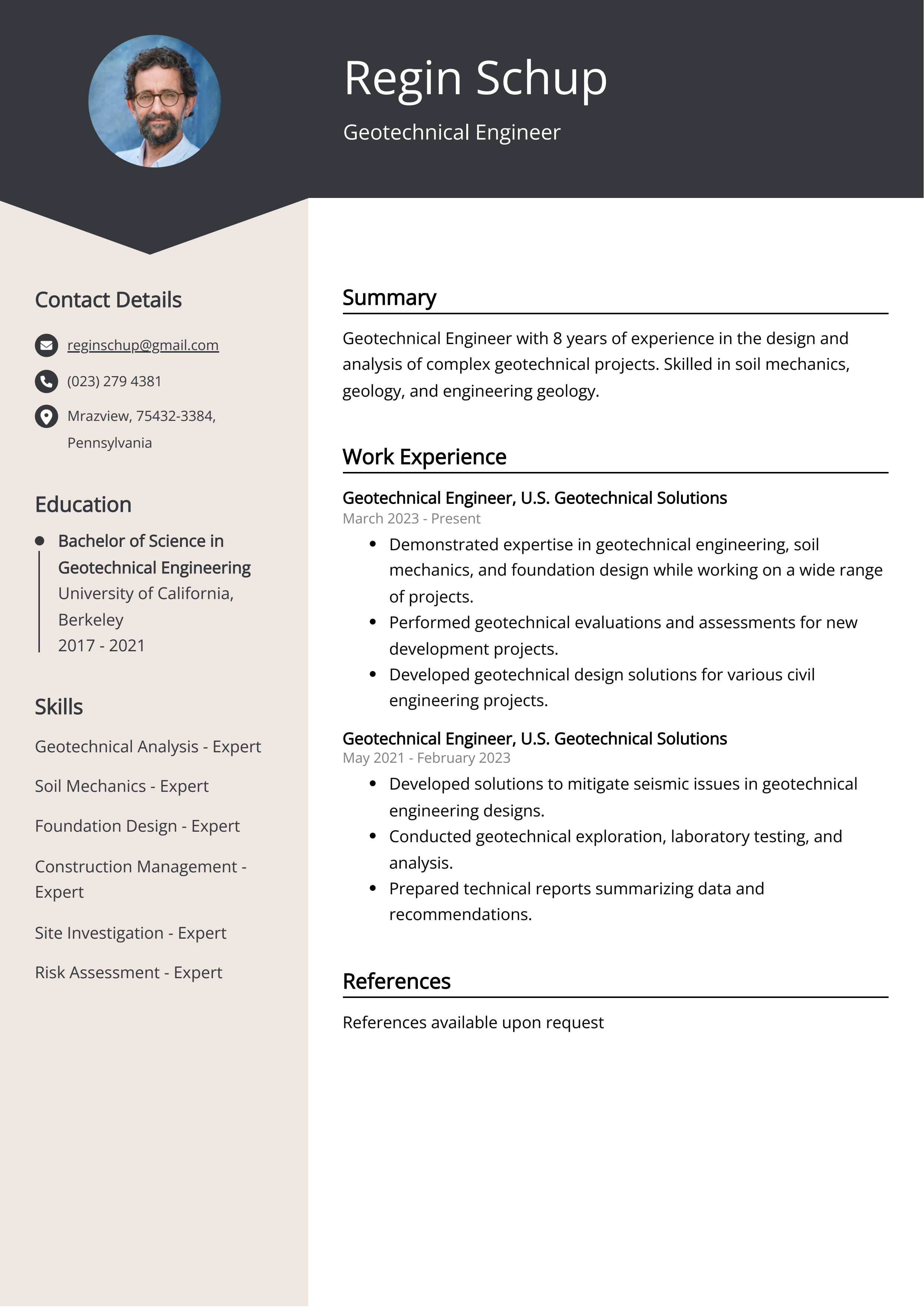The Ultimate Guide To Geotheta
The Ultimate Guide To Geotheta
Blog Article
Little Known Questions About Geotheta.
Table of ContentsAbout GeothetaThe 8-Second Trick For GeothetaSome Of GeothetaAn Unbiased View of GeothetaSome Ideas on Geotheta You Need To Know

They perform website examinations, accumulate samples, do laboratory examinations, and assess information to evaluate the viability of the ground for construction jobs - Consulting Engineer. Based upon their findings, geotechnical engineers provide recommendations for foundation style, slope security, keeping frameworks, and mitigation of geotechnical risks. They work together with various other specialists, such as engineers, architectural designers, and building teams, to guarantee that geotechnical factors to consider are incorporated into the total task design and application
By assessing the habits and buildings of soil and rock, they can recognize possible geotechnical dangers such as landslides, dirt negotiation, or incline instability. Their experience assists avoid failings or crashes that could threaten lives and home. Here are some detailed obligations and duties of a geotechnical designer: Website Investigation: Geotechnical designers conduct website investigations to gather information on subsurface conditions.
They translate the information to comprehend the residential properties and habits of the dirt and rock, including their strength, leaks in the structure, compaction qualities, and groundwater problems. Geotechnical Analysis and Layout: Geotechnical engineers analyze the data gathered throughout website examinations to examine the stability and suitability of the website for construction projects. They execute geotechnical computations and modeling to evaluate factors such as bearing capability, settlement, slope stability, side planet stress, and groundwater flow.
Geotheta for Beginners
Foundation Layout: Geotechnical engineers play a crucial duty in developing structures that can securely sustain the desired framework. They analyze the soil problems and load needs to determine the suitable structure kind, such as shallow structures (e.g., grounds), deep structures (e.g (https://www.twitch.tv/geotheta/about)., heaps), or specialized techniques like soil enhancement. They consider aspects such as settlement restrictions, bearing ability, and soil-structure communication to develop optimal foundation layouts
They review building strategies, monitor website tasks, and perform area inspections to validate that the style referrals are adhered to. If unforeseen geotechnical concerns arise, they analyze the scenario and offer referrals for remediation or changes to the layout. Risk Assessment and Reduction: Geotechnical designers assess geotechnical hazards and risks linked with the job website, such as landslides, liquefaction, or soil disintegration.

Cooperation and Interaction: Geotechnical engineers work carefully with various other professionals included in a job, such as engineers, architectural designers, and construction teams. Effective communication and cooperation are vital to integrate geotechnical factors to consider into the overall job style and building and construction process. Geotechnical engineers provide technological competence, solution inquiries, and ensure that geotechnical requirements are fulfilled.
The Best Guide To Geotheta
Right here are some sorts of geotechnical designers: Structure Engineer: Foundation engineers specialize in creating and assessing foundations for structures. They analyze the dirt problems, load needs, and site attributes to determine the most ideal foundation type and style, such as superficial foundations, deep structures, or specialized strategies like pile structures.
They review the aspects influencing incline stability, such as soil residential properties, groundwater conditions, and slope geometry, and develop techniques to stop incline failings and minimize risks. Earthquake Engineer: Quake engineers concentrate on examining and designing structures to withstand seismic pressures. They examine the seismic hazard of a site, review soil liquefaction potential, and develop seismic layout criteria to guarantee the safety and security and strength of structures throughout earthquakes.
They do area testing, gather examples, and examine the accumulated data to define the soil homes, geologic formations, and groundwater conditions at a site. Geotechnical Instrumentation Designer: Geotechnical instrumentation designers focus on surveillance and gauging the actions of soil, rock, and frameworks. They set up and keep instrumentation systems that keep track of variables such as soil negotiation, groundwater levels, incline activities, and architectural displacements to examine performance and provide very early warnings of possible issues.
Everything about Geotheta
They perform tests such as triaxial examinations, loan consolidation tests, straight shear examinations, and permeability examinations to collect information for geotechnical analysis and style. Geosynthetics Designer: Geosynthetics engineers concentrate on the design and application of geosynthetic products, such as geotextiles, geogrids, and geomembranes. They utilize these materials to enhance dirt security, strengthen slopes, offer water drainage remedies, and control erosion.
They tend to be investigatory people, which means they're intellectual, introspective, and analytical. They are curious, methodical, sensible, analytical, and sensible. Several of them are likewise social, indicating they're kind, generous, participating, person, caring, helpful, compassionate, skillful, and pleasant. Does this audio like you? Take our cost-free job examination to learn if geotechnical designer is just one of your top occupation suits.
In the office environment, geotechnical engineers make use of specialized software devices to do computations, create designs, and analyze information. They prepare records, evaluation job specs, interact with clients and employee, and coordinate job activities. The office setup provides a Read Full Article helpful atmosphere for study, analysis, and collaboration with other professionals included in the task.
The Single Strategy To Use For Geotheta
They regularly go to project sites to conduct site examinations, assess geotechnical conditions, and gather data for analysis. These sees involve taking a trip to different areas, sometimes in remote or difficult terrains. Geotechnical engineers might perform dirt tasting, conduct tests, and monitor construction activities to guarantee that the geotechnical aspects of the task are being executed properly.
Geotechnical engineers additionally function in specialized geotechnical labs. Geotechnical lab designers function extensively in these environments, taking care of screening tools, operating instruments, and recording information.
Report this page